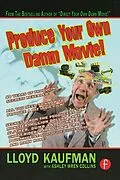Often low-budget filmmakers get thrown into the position of being not only the director, but their own producer. Using tips from the finest washed-up has-been producers in the business, this book will give the low-budget filmmaker practical tools for getting a movie shoot started, and keeping it going until it is supposed to end. From budgeting concerns to production-damaging acts of God, all will be discussed.
Autorentext
Lloyd Kaufman is one of the very few genuine auteur filmmakers. He has written, produced, and/or directed more than 25 films, including "The Toxic Avenger", "Terror Firmer", "Tromeo and Juliet", and "Poultrygeist: Night of the Chicken Dead". Kaufman is president of the world-famous Troma Entertainment, the oldest and, arguably, the longest-running truly independent film studio in history. He is also the president of the IFTA (Independent Film & Television Alliance), whose members produce more than 400 independent films and countless hours of television programming each year and generate more than $4 billion in distribution revenues annually.
Inhalt
This book will cover everything about production from the initial movie idea, all the way through pre-production and up to the first day of principal photography. Each chapter will include examples and material culled from interviews with filmmakers I know & have worked with, including Eli Roth (Director, Cabin Fever & Hostel), James Gunn, (Writer, Dawn of the Dead, Writer/Director, Slither), and Steven Paul (Producer, Ghost Rider, currently no. 1 in the box office), as well as low-budget filmmakers, all of whom have films currently in distribution. These filmmakers represent all of the 4 different models of independent filmmaking, as outlined in Chapter 1: 1. The 4 Types of Independent Films--Know What Damn Movie You're Making! -No Budget Model ($1K - $25K) -Credit Card Model ($25K - $250K) -Troma Business Model ($50K - $500K) --Indie Cross-National Model ($500K - $5 Million) 2. Tailor your script to your film ? Write Your Own Damn Movie! -Tailor your script to your budget (e.g., Micro-budget films often don't even have scripts) -Do I need actors attached? -Writing & re-writing 3. Finding Investors: Please Pay for My Damn Movie! -Mom & Dad, your local dentist -Arts Service Non-profits (e.g., Fractured Atlas)--make donations to your film tax-deductible ! -Writing proposals & grants -Filming a trailer -International co-productions -forming an LLC (leads to Chapter 4) 4. Legal stuff --forming an LLC, insurance, copyright issues -Forming an LLC -Production insurance -Interviews with entertainment lawyers 5. Locations--Can Tijuana pass for New York City? -Using government incentives to your advantage -Shooting on location vs. in studio -Contacting the local film commission -Location scouting 6. Crew -Determine needs: Will there be special FX? Stunts? Pyro? Or just Jimmy the PA watching camera equipment? -Union or non-union? -Craigslist, myspace, college campuses--great sources for the young, cheap, and horribly inexperienced -Find a DP & camera crew 7. Costumes, Props, Special FX -Getting as much for free as you can from local businesses -Product placement & $ponsors 8. Cast -Casting calls, callbacks,-- narrowing the field -Names vs. unknowns -Organizing a rehearsal schedule -Always have plan B, C, & D 9. Getting ready for principal photography -Setting a date -Making a realistic shooting schedule -Timing the script -Housing -Location permits & staging areas -Craft services 10. Filmmaker interviews / stories / advice -No Budget Model: Giuseppe Andrews (Director, Trailer Town, Actor, Detroit Rock City, Cabin Fever, & Independence Day) and Chris Watson (Director, Zombiegeddon) -Credit Card Model: Caleb Emerson (Director, Die You Zombie Bastards) -Troma Business Model: POULTRYGEIST: Night of the Chicken Dead -Indie Cross-National Model
